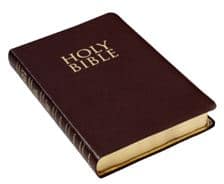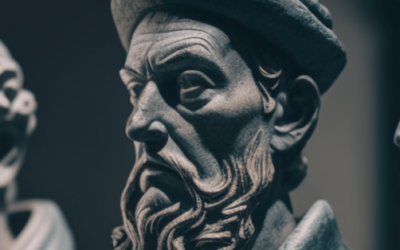The Roman Catholics and Eastern Orthodox both assert that the Early Church Fathers were unanimous in their teachings about tradition and scripture being, basically, equal in authority. They further assert that the ECF did not teach Sola Scriptura (Scripture alone) as the final authority for spiritual truth. They say this doctrine didn’t come about until the 1500s during the Protestant Reformation. Are they correct? See for yourself.
- Scripture Alone is final Authority
- Ambrose (340?-396), “How can we use those things which we do not find in the Holy Scriptures?” (Ambr. Offic., 1:23).
- Athanasius (300?-375),
- “The Holy Scriptures, given by inspiration of God, are of themselves sufficient toward the discovery of truth. (Orat. adv. Gent., ad cap.) The Catholic Christians will neither speak nor endure to hear anything in religion that is a stranger to Scripture; it being an evil heart of immodesty to speak those things which are not written,” (Athanasius, Exhort. ad Monachas).
- “After speaking of the books of the Old and New Testament he says, “These are fountains of salvation, that they who thirst may be satisfied with the living words they contain. In these alone is proclaimed the doctrine of godliness. Let no man add to these, neither let him take ought from these. For concerning these the Lord put to shame the Sadducees, and said, ‘Ye do err, not knowing the Scriptures.’ And He reproved the Jews, saying, ‘Search the Scriptures, for these are they that testify of Me.” (https://www.ccel.org/ccel/schaff/npnf204.xxv.iii.iii.xxv.html)Waste your time
- “Again it is not tedious to speak of the [books] of the New Testament. These are, the four Gospels, according to Matthew, Mark, Luke, and John. Afterwards, the Acts of the Apostles and Epistles (called Catholic), seven, viz., of James, one; of Peter, two; of John, three; after these, one of Jude. In addition, there are fourteen Epistles of Paul, written in this order. The first, to the Romans; then two to the Corinthians; after these, to the Galatians; next, to the Ephesians; then to the Philippians; then to the Colossians; after these, two to the Thessalonians, and that to the Hebrews; and again, two to Timothy; one to Titus; and lastly, that to Philemon. And besides, the Revelation of John. 6 These are fountains of salvation, that they who thirst may be satisfied with the living words they contain. In these alone is proclaimed the doctrine of godliness. Let no man add to these, neither let him take ought from these. For concerning these the Lord put to shame the Sadducees, and said, ‘Ye do err, not knowing the Scriptures.’ And He reproved the Jews, saying, ‘Search the Scriptures, for these are they that testify of Me.’ ” (Athanasius, Festal Letter 39:5-6).
- “Vainly then do they run about with the pretext that they have demanded Councils for the faith’s sake; for divine Scripture is sufficient above all things; but if a Council be needed on the point, there are the proceedings of the Fathers, for the Nicene Bishops did not neglect this matter, but stated the doctrine so exactly, that persons reading their words honestly, cannot but be reminded by them of the religion towards Christ announced in divine Scripture.” (Athanasius, De Synodis, 6).
- Augustine (354-430) “Whereas, therefore, in every question, which relates to life and conduct, not only teaching, but exhortation also is necessary; in order that by teaching we may know what is to be done, and by exhortation may be incited not to think it irksome to do what we already know is to be done; what more can I teach you, than what we read in the Apostle? For holy Scripture setteth a rule to our teaching, that we dare not “be wise more than it behoveth to be wise; but be wise, as himself saith, “unto soberness, according as unto each God hath allotted the measure of faith.”Be it not therefore for me to teach you any other thing, save to expound to you the words of the Teacher, and to treat of them as the Lord shall have given to me.” (https://ccel.org/ccel/schaff/npnf103/npnf103.v.iv.iii.html)
- Clement of Alexandria (150?-213?), “They that are ready to spend their time in the best things will not give over seeking for truth until they have found the demonstration from the Scriptures themselves,” (Stromata 7:16:3).
- Cyprian of Carthage (200?-258), “Whence comes this tradition? Does it descend from the Lord’s authority, or from the commands and epistles of the apostles? For those things are to be done which are there written . . . If it be commanded in the gospels or the epistles and Acts of the Apostles, then let this holy tradition be observed,” (Cyprian of Carthage, Ep. 74 ad Pompeium).
- Chyrsostom (344-386) “Wherefore I exhort and entreat you all, disregard what this man and that man thinks about these things, and inquire from the Scriptures all these things; and having learnt what are the true riches, let us pursue after them that we may obtain also the eternal good things.” (https://ccel.org/ccel/schaff/npnf112/npnf112.v.xiii.html)
- Cyril of Jerusalem (315?-386), “Not even the least of the divine and holy mysteries of the faith ought to be handed down without the divine Scriptures. Do not simply give faith to me speaking these things to you except you have the proof of what I say from the divine Scriptures. For the security and preservation of our faith are not supported by ingenuity of speech, but by the proofs of the divine Scriptures,” (Cat. 4).
- Irenaeus, (130-202), “We have known the method of our salvation by no other means than those by whom the gospel came to us; which gospel they truly preached; but afterward, by the will of God, they delivered to us in the Scriptures, to be for the future the foundation and pillar of our faith,” (Adv. H. 3:1).
- Jerome (342?-420), “Those things which they make and find, as it were, by apostolical tradition, without the authority and testimony of Scripture, the word of God smites. (ad Aggai 1) As we deny not those things that are written, so we refuse those things that are not written. That God was born of a virgin we believe, because we read it; that Mary did marry after she was delivered we believe not, because we do not read it,” (Adv. Helvidium).
- Origen (185?-252), “No man ought, for the confirmation of doctrines, to use books which are not canonized Scriptures,” (Tract. 26 in Matt.).
- Scripture Alone is not the final Authority
- Athanasius (300? -375), “But beyond these [Scriptural] sayings, let us look at the very tradition, teaching and faith of the Catholic Church from the beginning, which the Lord gave, the Apostles preached, and the Fathers kept.” (Athanasius, Four Letters to Serapion of Thmuis, 1:28).
- Basil (330-379), “Now I accept no newer creed written for me by other men, nor do I venture to propound the outcome of my own intelligence, lest I make the words of true religion merely human words; but what I have been taught by the holy Fathers, that I announce to all who question me. In my Church the creed written by the holy Fathers in synod at Nicea is in use.” (To the Church of Antioch, Epistle 140:2).
- Ambrose (340? -396), “Wherefore all other generations are strangers to truth; all the generations of heretics hold not the truth: the church alone, with pious affection, is in possession of the truth,” (Commentary of Psalm 118,19).
- Cyril of Jerusalem (315? -386), “But in learning the Faith and in professing it, acquire and keep that only, which is now delivered to thee by the Church, and which has been built up strongly out of all the Scriptures . . . Take heed then, brethren, and hold fast the traditions which ye now receive, and write them and the table of your heart.” Cyril of Jerusalem, Catechetical Lectures, 5:12 (A.D. 350).
- Gregory of Nyssa (330-394), “And let no one interrupt me, by saying that what we confess should also be confirmed by constructive reasoning: for it is enough for proof of our statement, that the tradition has come down to us from our Fathers, handled on, like some inheritance, by succession from the apostles and the saints who came after them,” (Against Eunomius, 4:6).






